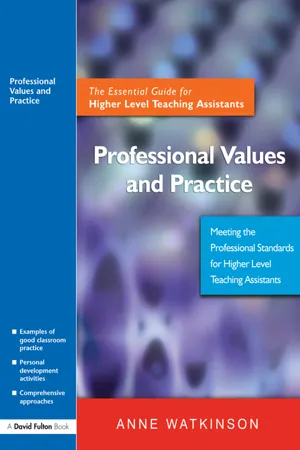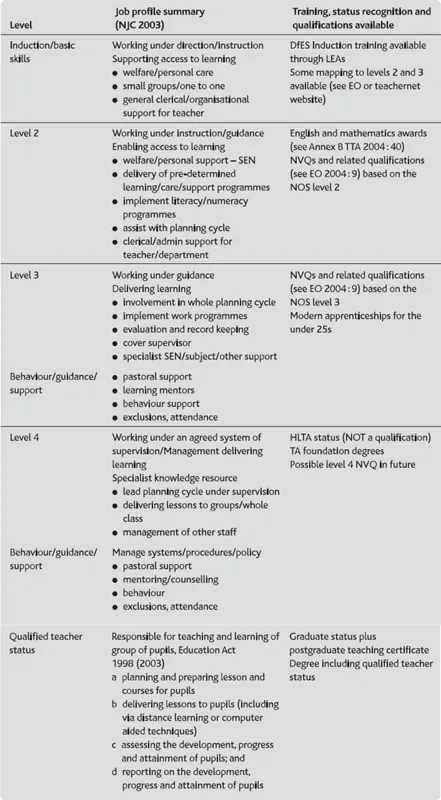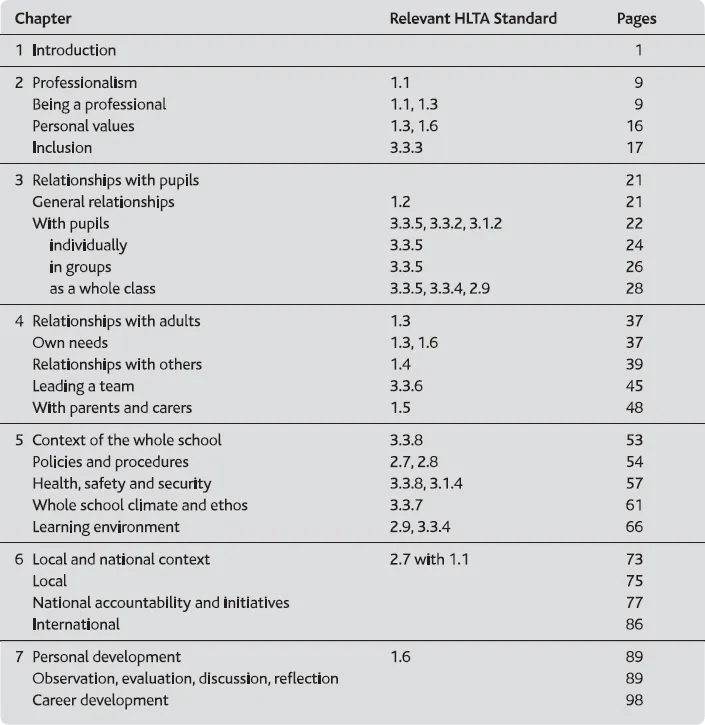
eBook - ePub
Professional Values and Practice
The Essential Guide for Higher Level Teaching Assistants
This is a test
- 124 pages
- English
- ePUB (mobile friendly)
- Available on iOS & Android
eBook - ePub
Professional Values and Practice
The Essential Guide for Higher Level Teaching Assistants
Book details
Book preview
Table of contents
Citations
About This Book
Professional Values and Practice concentrates on the more theoretical aspects of the HLTA role: professionalism, relationships, statutory frameworks and knowing your limits. It offers guidance and support on fulfilling the standards and succeeding both inside and outside of the classroom. This book provides:
- real-life case studies that put the theory behind the standards into a whole-school context
- practical activities that convey how the standards can be used in the classroom
- guidance on the school-based aspects of the training and assessment
- advice on the difference between the learning and teaching standards for newly qualified teachers and HLTAs.
This book is complemented by a companion volume, Learning and Teaching, which underpins the practical teaching skills required of teaching assistants at this level.
Frequently asked questions
At the moment all of our mobile-responsive ePub books are available to download via the app. Most of our PDFs are also available to download and we're working on making the final remaining ones downloadable now. Learn more here.
Both plans give you full access to the library and all of Perlego’s features. The only differences are the price and subscription period: With the annual plan you’ll save around 30% compared to 12 months on the monthly plan.
We are an online textbook subscription service, where you can get access to an entire online library for less than the price of a single book per month. With over 1 million books across 1000+ topics, we’ve got you covered! Learn more here.
Look out for the read-aloud symbol on your next book to see if you can listen to it. The read-aloud tool reads text aloud for you, highlighting the text as it is being read. You can pause it, speed it up and slow it down. Learn more here.
Yes, you can access Professional Values and Practice by Anne Watkinson in PDF and/or ePUB format, as well as other popular books in Education & Education General. We have over one million books available in our catalogue for you to explore.
Information
CHAPTER 1
Introduction
Background
The Higher Level Teaching Assistant (HLTA) status is part of the government’s larger reform of the school workforce which aims to raise standards and tackle teachers’ workload (DfES/TTA 2003a). The intention is that extra support staff, both inside and outside the classroom, will help teachers focus on their teaching role and provide more support for pupils’ learning so that higher standards can be achieved in the future. For you it means that you are able to go one step higher in the membership of a recognised profession. Your role is no longer invisible; people are proud to say they are teaching assistants, and non-educationalists understand some of the importance of your role.
For the first time you have something like a career ladder. Four levels have been agreed which fit into the national qualifications framework, HLTA status being in the highest level. National Occupational Standards (NOS) for level 2 and level 3 have been written (LGNTO 2001). HLTA standards have been drawn up by the Teacher Training Agency (TTA) (DfES/TTA 2003). The courses associated with these standards, along with the Department for Education and Skills (DfES) Induction Training for TAs, foundation degrees for TAs and the HLTA developments, mean that there is a framework of training associated with the career levels which is nationally available and recognised.
Awarding bodies have been busy drawing up courses to match the NOS, so that TAs can get national recognition for training. The DfES induction training is matched to the NOS, so that undertaking it can be credited where feasible. National Vocational Qualifications (NVQs) for TAs have been established for a year or so, and are recognised throughout Great Britain. The routes to achieving HLTA status are described in more detail in Chapter 7. There are various further (FE) and higher education (HE) colleges, LEAs and other course providers who are busy setting up systems and resources to teach all courses.
There is just one word of warning: HLTA status, if awarded, is not a qualification, it is a recognition of your competence and abilities to do the job. While it is considered that people acquiring this status will be operating at the equivalent of a second year degree level, it does not replace such a qualification. If you want to go on to be a teacher you will still have to undertake a full degree course in a chosen subject before qualified teacher status can be considered. The acquisition of the HLTA status could, however, provide evidence to any HE college of your experience, interest in education and level of competence.
Table 1.1 The possible range of tasks and levels for TAs in schools

Support through reading
This book is one of a series I have written supporting the various levels of TA development. Whatever stage you are at in your career path as a TA, you have continuing professional development needs. Reading and reflection are part of this process. The first three books in the series help TAs develop their thoughts at the various lower levels of the standards. The first, Assisting Learning and Supporting Teaching, was written to give some background after the introduction of the induction training materials (Watkinson 2002). The other two were written to support those TAs undertaking qualifications or wanting background reading when working at levels 2 and 3. These were called The Essential Guide for Competent Teaching Assistants and The Essential Guide for Experienced Teaching Assistants, respectively (Watkinson 2003a; 2003b).
This book is one of a pair being written to support the acquisition of the HLTA standards. They will not provide the detailed information you need for curriculum subject knowledge and understanding. They are not intended to help you with understanding the specific special educational needs (SEN) of individual pupils. They will not therefore cover all the standards. Standards 2.1, 2.2, 2.3, 2.4, 2.6, and 2.8 will all require more detailed study than either of these generic books will provide. This is important to remember, as to gain the award you have to show that you fulfil all of the standards. They are seen as an holistic set, not a set from which you can pick and choose, as with the NVQs.
The books are about the generic issues which underpin all that you do as an HLTA, regardless of whether you are specialising in a particular subject or SEN at whatever key stage you work in. This book deals largely with the standards, values and principles that underpin the practice of learning and teaching. The contents of the books will hold good whatever the subject matter being taught or whoever is teaching. The second book covers the putting of those principles into practice, again in a generic way. The books are not courses in themselves, nor do they pretend to provide the last word in the area. You need to meet, exchange views and see examples of good practice, find out about the latest resources and keep abreast of new ideas in education, teaching and learning and about children and young people themselves. Above all you need to be working in a school, where all the staff take part in in-service education for teachers (INSET) activities, where you feel able to ask questions and where you can find support of various kinds.
It is essential that someone on the teaching staff takes a particular responsibility for the TAs in order that there can be in-house training and liaison over curriculum and pupil-related matters. Hopefully, if you are participating in any formal course, you will have a mentor. It is important for an HLTA that this is a teaching staff member, as you will need to learn about many of the activities of the teachers. You will be teaching classes, not acting as a cover supervisor. If you go for HLTA assessment, you will need a spokesperson teacher to talk with the assessor. It is possible that for the lower levels of TA, a more senior TA could be a suitable mentor.
No book or course can provide you with all you need to work as an HLTA; actual practice in schools must be both observed and experienced by you alongside the discussion with relevant staff about what and how things are done. All schools are different and have their own policies and procedures, both written and understood. The culture and ethos – the ways in which a learning atmosphere is created – are difficult to define in words. They can, however, be felt and observed. The legal requirements for schools all need to be backed by the school’s interpretations of how these measures are observed in the particular building, or with the particular range of people and pupils who have contact with the school.
If you are not undertaking a formal course, it is hoped that the book and its companion volume will provide a useful reference for general use at the higher TA level. It is also important, at the higher level, that you read more widely, as a course textbook must be a basic text. The level of study for HLTAs is recommended to be at second year degree level. These books will give some recommended reading for you to dip into. Your local library will be able to get the books referred to, or some of the teachers may already have copies. There may even be a staffroom library, or you may live near a teacher training college that will have many relevant books.
Some of the books in such a library will seem rather theoretical and possibly difficult to read, but you should, at this level, be able to dip into books and seek out relevant passages or chapters fairly easily and will have, hopefully, a good grasp of most of the educational jargon. Librarians of such colleges can be a most valuable source of expertise and help you find books in the area of your particular interest. There is already a wide range of books available from David Fulton Publishers, already often used by those of you who support SEN, for conditions such as Asperger’s Syndrome, Down’s Syndrome, visual impairment, dyslexia, speech and language difficulties, gifted and talented, and so on. Do get hold of the latest catalogue from David Fulton Publishers and further information by using their website.
If this is the first time you have studied since leaving school, you are going to find some of the study hard. You need to consider whether you should undertake a short course in study skills. Successful Study (Ritchie and Thomas 2004) was particularly written with TAs in mind who are aiming to undertake a foundation degree. Ask at your local FE college what is available for returners to study. Some of the books being written to support foundation degrees for TAs will be of interest to you.
If you are considering whether to undertake the training, and how any existing qualifications and experience fit into the requirements, including the foundation degrees, or just reading this book, you will need both a copy of the standards (DfES and TTA 2003) and a copy of the TTA Guidance to the Standards (TTA 2004).
This book
This particular book of the generic pair will address the more intangible areas of your professionalism, and the principles and values which underpin so much of what happens in schools. Chapter 2 covers these within the umbrella of professionalism. Schools are organic living things, dealing with human beings, both adult and growing, who have feelings and needs. These must be considered before and alongside all the technical matters of curriculum and technique. Chapters 3 and 4 therefore deal with the relationships you need to consider with pupils and other adults. Chapters 5 and 6 address your legal obligations to the pupils in your care and your work colleagues. Chapter 5 looks at the context in which you work, the whole-school scene and the policies within which you work. The policies of the school will be their interpretation of how the law is to be upheld in the local situation. The importance of the school’s ethos and culture is emphasised. As an HLTA, you should be taking a leadership role and considering influencing the formation of school policies. You are working in the school, becoming part of the establishment, ensuring you respond to consultations and attending appropriate meetings to voice your opinion.
Chapter 6 looks at the legalities through a national perspective. Central accountability, directives and initiatives have increasingly directly affected the way in which a school works. You cannot change the legal framework except, in a democratic society, by using your access to your MP to change laws through acts of parliament. Finally, Chapter 7 will give you pointers to the ways in which you can ensure your continued professional development within the education system. Your final career destination may not be within education but in one of the other caring professions such as medicine or social services. Becoming an HLTA is more clearly aimed at those of you wishing to make schools your long-term destination. Hopefully, for many of you, HLTA status will be the pinnacle of your aspirations, as Nurse Practitioner status is for nurses. But just as in medicine some nurses go on to be doctors, probably about 10 per cent of you will wish to use this training and experience to go on to be fully qualified teachers.
As with the level 2 and level 3 standards, many of the standards need to be cross-referenced. For instance, professional values and practice must hold through all the teaching and learning activities or they are pointless. I therefore choose to use a more holistic and apparently mixed approach than the standards can. By their nature they have to be a list. The NOS were also very detailed, and could be carefully referenced in the Essential Guides. The HLTA standards are much less specific and not so accessible to careful referencing. Reference will be made where appropriate. The numbers in square brackets indicate a reference to particular HLTA standards. Where some items were dealt with at length in the lower-level books, they will be not be repeated in this book, but page references to them are given. It is therefore assumed that, because you have access to these books or you have sufficient experience, you will have dealt with the issues concerned anyway.
The table above gives you a rough guide as to where to find some of the content in this book. The second book will deal more specifically with the section 2 and 3 HLTA standards.
Table 1.2 The general areas of this text relating to HLTA standards

There are examples of practice given throughout the book, but you may be able to add some of your own.
There are some reflective activities for you to undertake or discuss with a colleague and there is an additional reading list at the end of each chapter, a few items of which are essential for an aspiring HLTA, and some you can dip into as your interest leads you. Good reading!
Essential reading
DfES and TTA (2003) Professional Standards for Higher Level Teaching Assistants. London: Department for Education and Skills and the Teacher Training Agency.
TTA (2004) Guidance to the Standards – Meeting the Professional Standards for the Award of Higher Level Teaching Assistant Status. London: Teacher Training Agency.
Some further reading
Barrow, A. (2004) ‘The changing educational scene’, in Bold, C. (ed.) Supporting Learning and Teaching, pp. 14–33. London: David Fulton Publishers. A brief résumé of educational history giving background.
Cole, M. (ed.) (2002) Professional Values and Practice for Teachers and Student Teachers, 2nd edn. London: David Fulton Publishers. A reader of articles written by various authors to each of the standards for qualified teachers; worth dipping into.
Hayes, D. (2003) Planning, Teaching and Class Management in Primary Schools, 2nd edn, Chapter 8: ‘Professional values and practice’, pp. 117–132. London: David Fulton Publishers. A structured approach for trainee teachers.
O’Brien, T. and Garner, P. (2001) Untold Stories – Lear...
Table of contents
- Cover
- Half Title
- Title Page
- Copyright Page
- Table of Contents
- Preface
- Acknowledgements
- Abbreviations
- 1 Introduction
- 2 Professionalism
- 3 Relationships with pupils
- 4 Relationships with other adults in school
- 5 The context of the whole school
- 6 The local and national context
- 7 Personal reflection and development
- Useful websites
- References
- Index